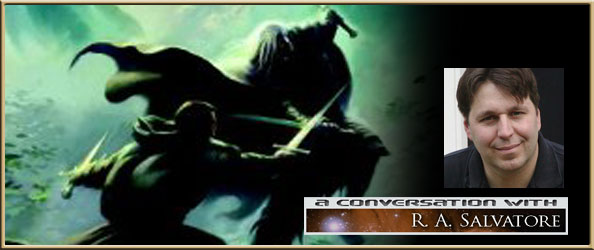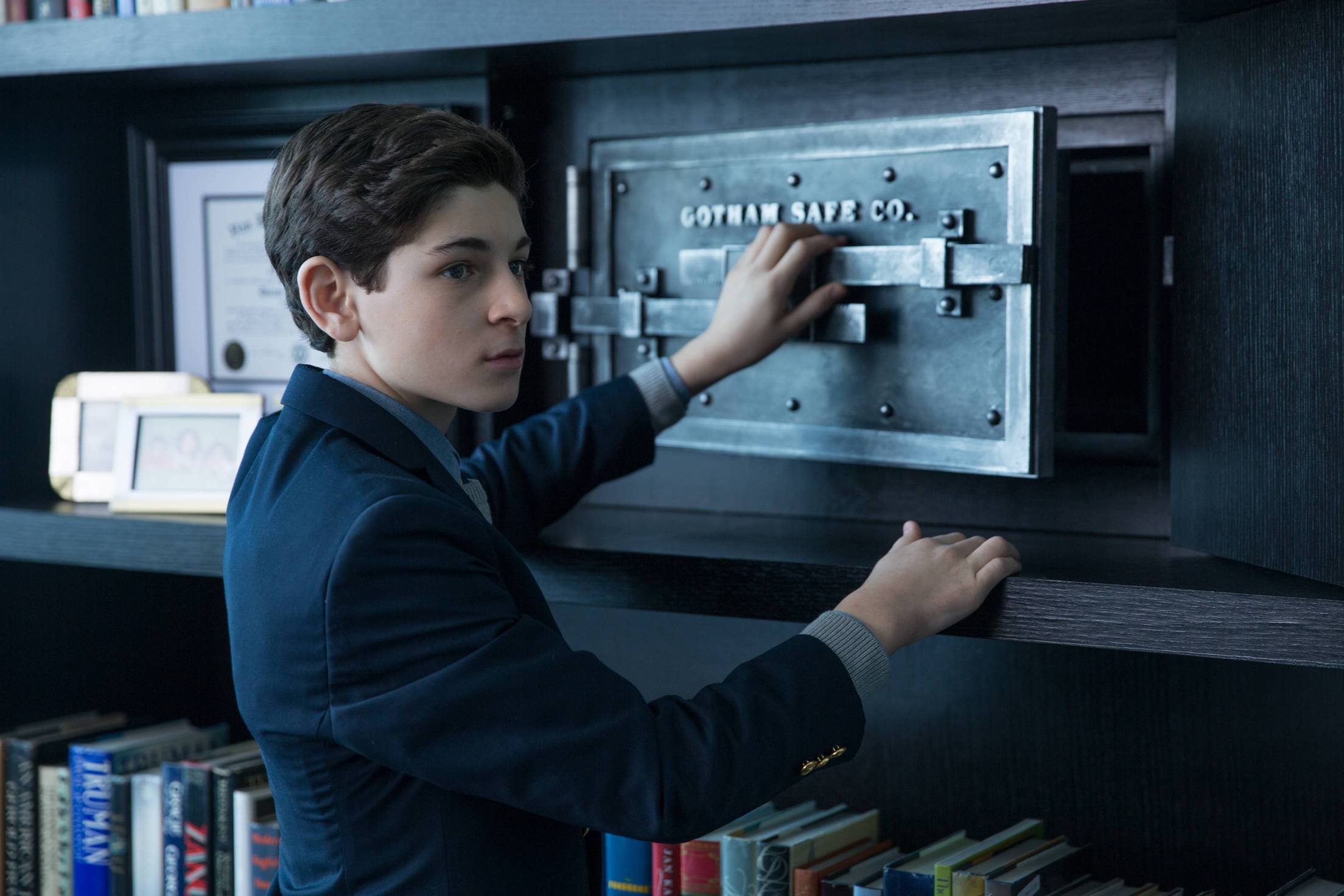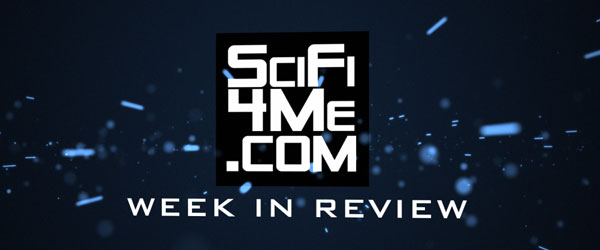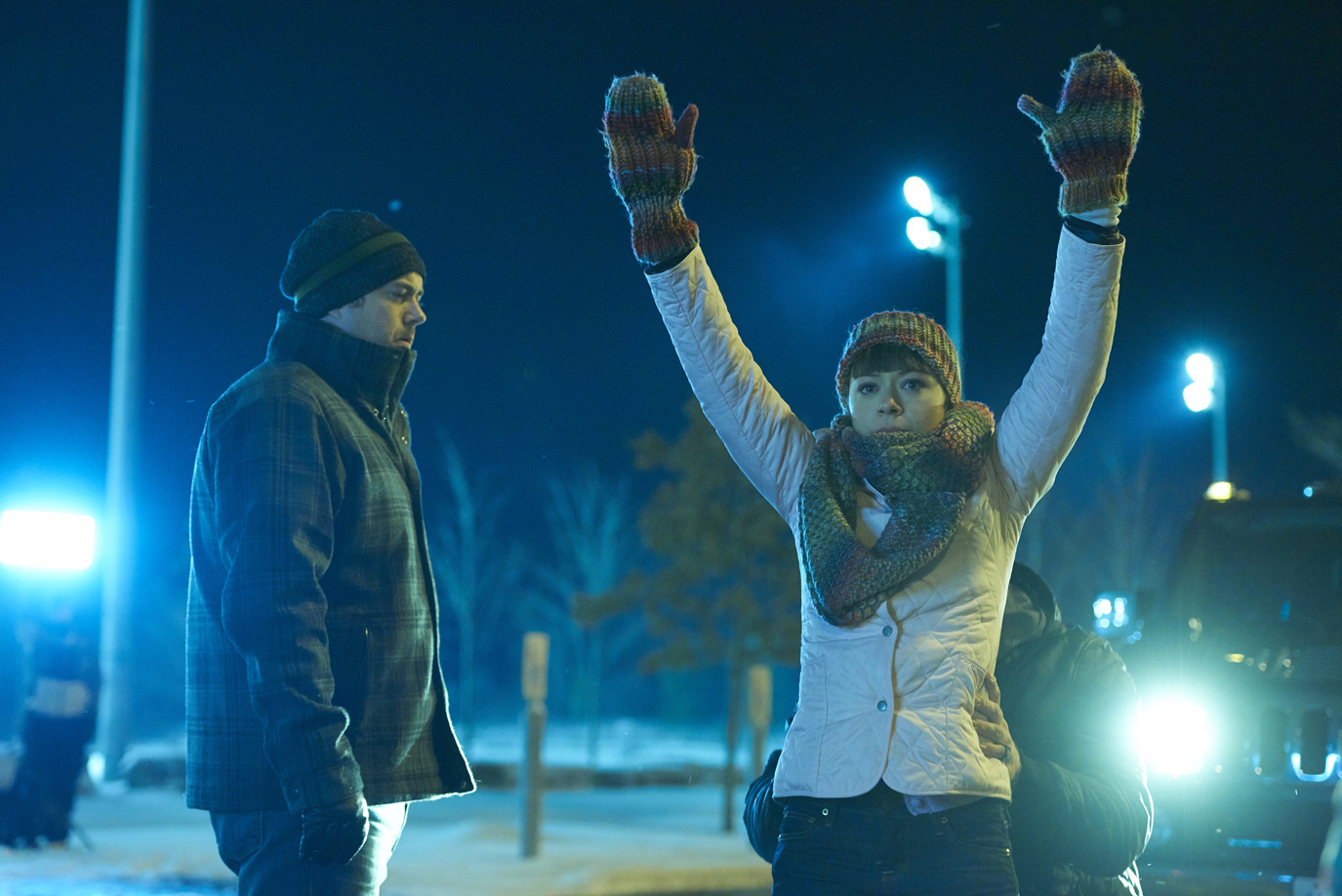R. A. Salvatore Talks NEVERWINTER & Publishing
For some, the name R. A. Salvatore is synonymous with gaming novels. He’s been a long-time writer in the “Dungeons & Dragons” mythology, contributed frequently to the “Forgotten Realms” story land, and has even dabbled in the Star Wars universe. An advocate of libraries and prolific writer, Salvatore is talking about his newest book, Neverwinter. It’s the second in the Neverwinter series, featuring frequent lead character Drizzt the dark elf.
I got a chance to talk with him about the new book, and other topics around the new age of digital publishing, what it means for writers, and what it could mean for libraries.
[Transcript follows]
 On the phone with R. A. Salvatore, author of several novels in the Dungeon & Dragons and Forgotten Realms. The new book: Neverwinter, which is book two of the Neverwinter Saga. It drops on October fourth published by Wizards of the Coast and it features a character that many are familiar with from all of these different novels: the dark elf Drizzt. And he’s got a new companion. We’re picking up where the second book – where the first book left off, rather… Is Drizzt a favorite character of years is that why we keep seeing him show up in these books?
On the phone with R. A. Salvatore, author of several novels in the Dungeon & Dragons and Forgotten Realms. The new book: Neverwinter, which is book two of the Neverwinter Saga. It drops on October fourth published by Wizards of the Coast and it features a character that many are familiar with from all of these different novels: the dark elf Drizzt. And he’s got a new companion. We’re picking up where the second book – where the first book left off, rather… Is Drizzt a favorite character of years is that why we keep seeing him show up in these books?
RAS: He started out as a sidekick character, actually. I mean, he wasn’t even in the original outline for The Crystal Shard back in 1987 when I was writing it. And it turned out I needed a sidekick. I had to come up with one quick, and off the top of my head, I came up with a dark elf named Drizzt Do’Urden. And they said “OK”, they’d let me get away with writing a dark elf character – at that time, dark elves were just monsters. They weren’t considered, you know, good guys in any way.
They let me get away with writing it because it was just a sidekick, but when I started writing the book, I was about three pages in, and I knew it was his book. There was a connection there, immediately, between me and this character. And I think he really sealed the deal when, a few years later, I had written six books, including the three detailing his origins, where he came from and how he got to where he was, and he kind of sealed the deal with me at that point. But yeah, he’s an absolute favorite character of mine. He is as much my favorite character as Sherlock Holmes was Conan Doyle’s, Arthur Conan Doyle’s favorite character. I have to admit that.
I was talking to David Weber a while back, about the Honor Harrington series, and the topic came up – the fact that the Honor Harrington was supposed to die at one point in the storyline and because the character had gotten to be so popular, David really couldn’t do that. Have you ever contemplated the death of Drizzt? I mean is he is he somebody that’s going to stick around no matter what, or do you have a death scene written and tucked away somewhere?
RAS: I have. I do. I almost went through with it at one point, but they wouldn’t have let me when, back in the mid-nineties I was breaking up, very painfully, with TSR over creative differences. You know, I’m writing the story. I’m almost afraid it will happen. Because if the story tells me to do it, I’ll do it. I’m not planning out that far ahead so that I can say it will happen, and I’m hoping it doesn’t, just like I was hoping a lot of the other characters wouldn’t go away – other characters who have gone away. And at this point, I treat this series as if I’m walking down a road with these characters and they’re telling me what’s going on.
It’s as much fun, for me, writing the books as it is for people reading the books, because I really don’t know what’s going to happen page to page. But yeah, I have. At one point, I almost did it. At one point, I really wanted to do it, not because I was sick of the character, but because I knew that after I got pretty much thrown out of TSR, that they were going to have other people writing the character, and that was worse to me. So, it could happen.
So, what can you tell us about the new book? He meets Dahlia, who’s another elf, and he’s dealing with the fallout from the last book, the cataclysm at Mount Hotenow. What can you tell us about this new book? Where are we going in this one, and how many books do you see in the Neverwinter saga, storyline?
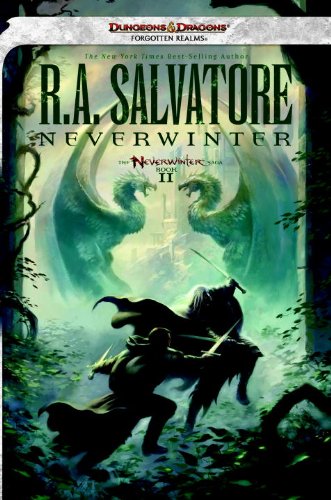 RAS: Well, the Neverwinter storyline – I don’t ever think of the books in terms of trilogies. To me, it’s just the next logical step for the character. I try to make each book self-contained – with a beginning, middle and an end. You can read one without having to read the previous ones, although I hope you’ll go back and start at the beginning. But, there are planned three books for this arc, that has to tie in with the video game that’s coming out, Neverwinter Knights 3. I’m not sure when it’s coming, at this point.
RAS: Well, the Neverwinter storyline – I don’t ever think of the books in terms of trilogies. To me, it’s just the next logical step for the character. I try to make each book self-contained – with a beginning, middle and an end. You can read one without having to read the previous ones, although I hope you’ll go back and start at the beginning. But, there are planned three books for this arc, that has to tie in with the video game that’s coming out, Neverwinter Knights 3. I’m not sure when it’s coming, at this point.
So I’m writing on two levels here. One level is that I’m writing books to set up the video game. I’m not writing the story of the video game, but I’m writing books to leave that region of the Forgotten Realms in the shape that Cryptic Studios wants it in so they can do the video game.
But that’s kind of a macro-dressing level, a cake frosting level. And the really interesting thing that this story’s allowed me to do, is for all of the years I’ve been writing Drizzt, other than his first book in Menzoberranzan, he’s surrounded himself with characters who are of like heart. People who would jump in front of him to take an arrow aimed at his heart like he would save them with his own life. You know, his friends were people of similar morals, and now all of a sudden, he’s surrounded by people who really don’t share his moral code. And so the question is, do they bring him down or does he bring them up, or is it a combination of the two? And I don’t even know the answer to that, which is why I’m having so much writing it.
Is that something you’ve done before, writing with a specific goal in mind and deals with another tie-in, whether it’s a video game or a graphic novel. You’ve got a specific destination that you have to arrive at in order for another piece to fall into place in the right way?
RAS: Yeah, that’s been going on forever and ever with Forgotten Realms, because it’s a shared world. So I have to constantly be aware of what they’re doing when they put out new editions of the Dungeons & Dragons game, because this is home base for the Dungeons & Dragons game, so when they make changes – like many, many years ago, they had a thing called the “Time of Troubles”, when they went from first edition to second edition Dungeons & Dragons – there were many changes made in the world and in the game, and the books had to reflect those changes in some way.
And again, they let me – I’m not writing the core stories for this, so I don’t have to worry about all the exact details. I just have to put the flavor right in the books, for the changes. But yeah, that’s been going on, that’s the nature of shared worlds. It’s something you have to be able to do. Because if you didn’t have that, the novels would become so disjointed and the game products would become so disjointed, that there would be no immersion for the fans. They would have no… there’d be no sense of “This is the way the world is” over all these different products.
So, yeah I’ve been… Many, many times I’ve started writing a book, and I’ve gotten that phone call saying “Well, this is what’s going on in that region at that time. Is there some way you can incorporate some of these things, at least as side story?”
Do you find that writing franchise tie-ins is easier than doing original pieces, or is it just different?
RAS: It’s mostly the same, because in the end you’re writing about characters that people are going to care about or not care about, and so whether I’m writing my own books like Demon Wars or Spearwielder’s Tale or Crimson Shadow or some of the other series I’ve done – The Highwayman – when I’m writing these books, or I’m writing Forgotten Realms, the characters are what matters. The characters are the things that are going to make the people relate to the story. And then, other than that, I mean is it harder for me to sit down and create a world out of whole cloth, that has a distinctive magic system, or is it harder to write within the constraints of somebody else’s magic system? They’re different skill sets, to some extent, but I wouldn’t say one is harder than the other. The creativity level is certainly… As much as a shared world can kind of hem you in, it can also give you inspiration, so it all evens out. I don’t find one harder than the other.
You mention The Higwhayman and Demon Wars. The Highwayman is not part of a series and is one of the few that you’ve written that was just a “stand alone by itself” book. Are we spoiled for trilogies now, because of films not being a single film? We go in – Back to the Future, Avatar, and Harry Potter, and all of these different films that are out there that have us … are we spoiled for sequels now?
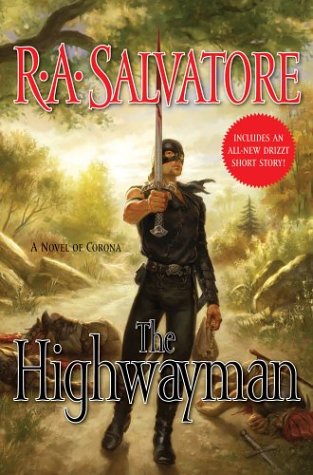 RAS: I don’t thinks it’s even for the reason you state, but yeah, I think we are. But it’s more got to do with the fact that a publisher is going to have a hard time building the kind of audience that makes it profitable on a single book. And the publishers know that, and that’s why they want three, four, or whatever. Or an unending series.
RAS: I don’t thinks it’s even for the reason you state, but yeah, I think we are. But it’s more got to do with the fact that a publisher is going to have a hard time building the kind of audience that makes it profitable on a single book. And the publishers know that, and that’s why they want three, four, or whatever. Or an unending series.
And The Highwayman – you say The Highwayman was a stand-alone book, but I’ve written three more. The Highwayman is a stand-alone book. You don’t have to read anything after The Highwayman, but I wrote The Ancient, The Dame, and The Bear following The Highwayman, because I grew interested in the character. And it’s the same thing I say with the Drizzt books. You can pick up The Thousand Orcs and read it. You can pick up The Lone Drow and read it. You don’t have to read the whole series. In a way, I’m doing more like Sherlock Holmes or James Bond than I am The Wheel of Time or Song of Ice and Fire, where those books really build into the next book, build into the next book, build into the next book. You can’t pick up the tenth book of The Wheel of Time and read it and have any idea what you’re reading. But you can pick up the tenth book of the Drizzt series and read it because it’s a single book.
But yeah, people… because there are so many choices, because there are five hundred channels on your TV, and there are 120,000 books published each year, you have to create something bigger than the individual novel now, it seems like, especially in genre fiction, to keep going. And that’s why you have so many, you know, detective series focused on one character and fantasy series focused on one world or one group of characters.
And is it a good thing or a bad thing? I’m not sure. At times, I think it is a bad thing. You know, are we ever going to have a Catch-22 again, or a Slaughterhouse Five, or will we then have to go on and read the continuing adventures of Billy Pilgrim in Slaughterhouse Six or something? You know?
Is electronic publishing having an impact on that as well, because a lot of the franchise bits now…You’re having novels and graphic novels, comic books, video game tie-ins, merchandising. How much of an impact do you think that’s having on the publishing industry are we usually seen everything being influenced by what else can be sold or are they just finding something–
RAS: I tell you, I’m looking at my back list very carefully now, and I’ve just did an analysis, because I track all my numbers. I like to know the trends out there. And if I go back over the last three years, the top level numbers of the individual titles is very similar. It’s within a few percent, one way or the other. So it’s stable.
But e-books have gone from two percent, to nineteen percent, to forty-one percent of my back list sales over the last three years. That’s huge. And I think there are going to be a lot of repercussions that come out of that. And most of them, in the end, may be seen negatively. I’m not sure yet. But here’s a couple of things I think are going to happen: you’re going to have tons of self-publishing. You already do. And without the filter of the publishers, that can be a really devastating thing to readers. I’m not saying people who self-publish shouldn’t be published. That’s not what I’m saying. But the fact is, without that filter kind of narrowing it down, the idea that you’re going to be reading a book that someone – one of your friends – is also reading , becomes very minimal. Because there’s so many choices, maybe too many.
It’s not like music, where you can listen to a song at three minutes. To read a book is a multi-hour investment of time. And so with that filter of the publishers … the publishers used to be the ones who used to get the thousand manuscripts, narrow it down to a few they think should be published. Were they always right? Absolutely not. I mean, Dune was rejected thirteen times before it finally got published, and Dune is arguably one of the top two or three science fiction books of all time. Brilliant work. And it was rejected. So they don’t always get it right, and there are lots of people who don’t get published who should.
But there are also lots of people who haven’t polished their craft enough who are going to be published now, self-publishing. And so you’ll find tremendous grammatical, spelling, sentence structure, logic mistakes in a lot of self-published books because they’re not getting the editorial support they need. They don’t have the editors helping them hone their craft. I mean, my biggest learning experience as a writer didn’t happen in college. It happened when I wrote The Crystal Shard and I had an editor on the phone with me for fifteen hours straight beating the ever-loving tar out of me. That’s what editors bring. And the editors are being lost in the shuffle now, because people are self-publishing. “Oh, I wrote this book and I want to publish it.” You know you’re not going to make a lot of money, even though you’ve published it. Are you going to spend five thousand dollars to go hire an editor? Probably not. So, there’s a lot of pitfalls.
And the other thing that scares the heck out of me with the electronics is that I really believe that content is going to be shrunken down. I think short stories are going to come back strong. But they’re just going to be pieces of a bigger story, not the crafted short stories of a James Joyce, but just pieces of a bigger story because people are going to be looking for those micro-transactions. “What can I do and put out there for ninety-nine cents?” So yeah, I think there are potential pitfalls. In the end, it should wash out. In the end, it should find the best model, and I have faith that the best model will also be the best model for creativity and for story-telling, but I’m scared.
Now, what kind of an impact do you think electronic publishing is going to have on libraries? We see what’s happening with the US Postal Service, you know, having trouble staying solvent because of e-mail and FTP servers and in that sort of thing. Are we going to see libraries at some point become a thing of the past? I know that’s a big thing, a big passion for you.
RAS: Yeah, I’m glad you asked that, actually.
Where are libraries going to be in the twenty first century? Are they relics now?
RAS: They’re not relics now. But they certainly are becoming more and more like a computer hub for people who can’t afford the Internet or computers of their own. They’re becoming more video based. People go to libraries to borrow movies all the time. I mean, the number of videos that you’re seeing going out is just huge. They’ll still be places where people go to do research. I think that vibrant libraries have to have lots of adult and children’s programming to bring people together, almost in a community center type of way, either with adult learning centers and children’s story hour and concerts, even. In a lot of the libraries, now, you’re seeing them having musicals. So a lot of the new libraries will have auditoriums in them. Ours does.
I was recently out, a couple of years ago on a book tour, and I was out in Cerritos, California, and they have this absolutely amazing library. I don’t know how much it cost, but it was in the tens of millions. It is just beautiful. It’s more like a museum than a library. And they had something like a hundred and eighty public access computer stations in that library.
Wow.
So, they’re going to adapt. They’re not relics yet, but they certainly … when we get through the next wave of building – even if the money’s there, even if people start believing in public financing of things again, which I hope they do – the libraries that are built now and ten years from now are not going to look like the book warehouses of the 1960s or the Carnegie buildings that were built around the turn of the twentieth century. They’re going to be very different. I mean, you’re going to be seeing people going in there with their Kindles and borrowing books by holding them up to a little dot on the wall and just downloading. You’re already seeing that.
Right.
RAS: Again, good or bad? I don’t know. It is, so we adapt and we go on, right?
Well, yeah, some of us. I mean, I myself consider myself a dinosaur. I’m still a real big fan of hard cover books, books that you can hold in your hand and movies that are shot on film, so I’m in the minority, still.
RAS: I’ve never read a book on a computer screen except for my own in the rewrite process.
Now, has that changed a lot with electronics now, in that process of finishing a book? I know you probably type it out on a computer or you dictate it in some software that writes it out for you. And then your process, in the editing standpoint, you’re not getting anything from the editors in the mail in a big envelope with a bunch of marks on it. You’re getting something electronic.
RAS: Right.
Has that made it easier?
RAS: Absolutely, it makes a difference. Of course, if you’re not careful, you could start to wonder, “Wait a minute. Which version is this? Is this the edited version or the unedited version?” You have to be very careful when you have multiple versions working. The good thing is now, a lot of the word processing programs like MS Word have … they have a bubble, a note bubble section that you can put in. So you’re getting red-marked manuscripts back now. For a while, we didn’t have that. And so, you know, people would go, “Well, I bolded all the parts I think should be changed,” or something. Or, “Any words I changed, I bolded them so you’ll find them.”
And it’s amazing, though, because even with … one of the problems is that you can become too reliant on … for the author, you can become too reliant on Spell-Checker, so you’re not reading carefully enough to catch the “hte” instead of “the” assuming the spell checker will catch it, and it doesn’t catch them all.
And then, for the editors sometimes, they get too into this grammar checker thing. And grammar checkers make insane. Because there are times when books are not grammatically correct by the hard and fast rules on purpose, because we’re doing things for effect. A sentence fragment that stands as its own paragraph is not going to pass a grammar checker. But that sentence fragment that’s standing as its own paragraph is only there so that I can get the reader a little closer to the edge of his or her seat.
Right.
RAS: It’s done on purpose. And a writer knows to use the rules, knows all the punctuation, all the capital letters and all the rules of the English language are really tools for communication. A grammar checker thinks they’re hard and fast rules. There’s a difference. And you can lose a lot of that if you if you start becoming reliant on technology, because technology doesn’t understand that difference.
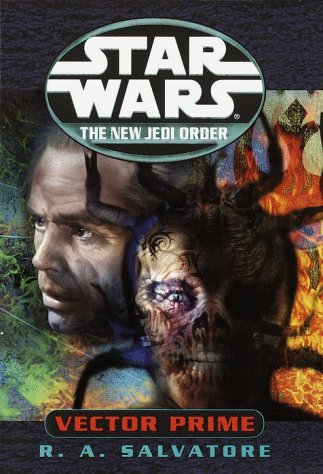 Now, speaking of keeping readers on the edge of their seats… Vector Prime.
Now, speaking of keeping readers on the edge of their seats… Vector Prime.
RAS: Vector Prime!
Vector Prime. Do you still get questions, do you still get flak about being the writer who killed Chewbacca? I know you were working under orders, but how did that feel when they told you “OK, you’re going to kill off a major character in the Star Wars universe”?
RAS: Well, I can’t repeat what I said. It began with an “F”. When they told me it was Chewbacca… Basically, it went down like this: they asked me to come aboard and do a book, because they needed to get a book out before Christmas, was the thing. They’d just won the license from Bantam – Del Rey had just won the license. It was a huge license. They needed to get a Christmas book out. I was working for them doing my Demon Wars series. I was also writing Drizzt books, but they knew I’m a very fast and clean writer. What I mean by “clean” is that my books come in, the change between the manuscript I send the publisher and the final book that goes out is never more than a couple of percent. I’m a clean writer. Get it right the first time, or I get it the way I want the first time.
So, they knew I could write it quickly. They called me up in, like, August and asked me to come aboard. I got permission from Wizards of the Coast to delay the book I owed them because they thought it would be great exposure for me to do a Star Wars book, and they knew I really wanted to do it. And then I came in. I signed the contract. I got the advance and put it in the bank, the advance check. I came up with this big outline. I sent the outline in, from all the information they had sent me. And I’m on the phone with Lucasfilm and Del Rey, and Sue Astoni , maybe it was Lucy Wilson from Lucasfilm, says, “This is great! This is exactly what we’re looking for, but didn’t anyone tell you? You have to kill Chewbacca.”
And that’s when I dropped an f-bomb.
But they convinced me they were doing it for the right reasons, so I agreed to do it.
Any regrets?
RAS: Yeah, tons. Honestly. Tons of regrets. I’m not sure they made the right choice. I know why they were doing it. I know what they felt the series needed. But what do you say to a 40-year-old guy who comes up to you and starts crying because you took away – I mean, he used to sleep with his Chewie doll when he was a kid – what do you say to a guy like that? And he’s not crazy. This was an important part of his childhood, that was taken away and you could argue, for marketing reasons. I don’t think it was that. I think it was for creative reasons. But yeah, tons of regrets. Knowing what I know now about the reaction to it, if they had called me and asked me to do it I probably would say “no”. Not only would I say “no”, but I would argue against them doing it.
Death threats and stuff, no. But what I do get is, I get people at book signings who say their brother was going to come but he wouldn’t because he hates me because I killed Chewbacca. I still get that.
Hopefully, you won’t deal with the same fallout if that ever happens with Drizzt.
RAS: Yeah. I have no answer to you. It was a tough time. It was doubly tough because that book came out right when my brother passed away, and so I’m dealing with that on a real level and now I’m dealing with death threats about the death of a fictional… a fictional character’s death at the same time. It was a very, very strange … 1999 was very strange for me.

